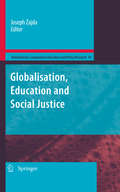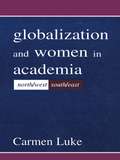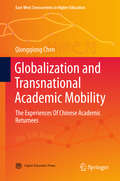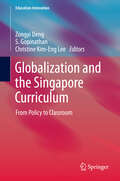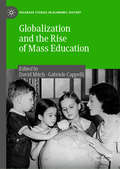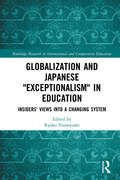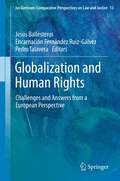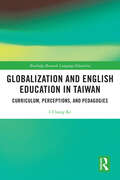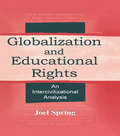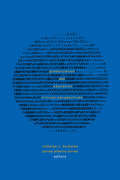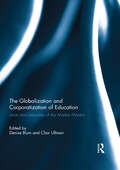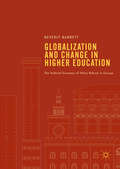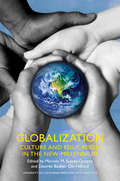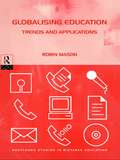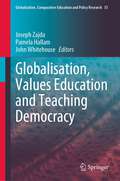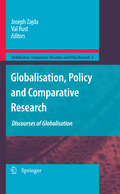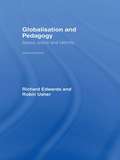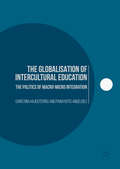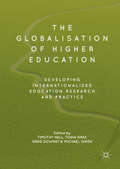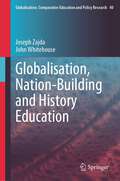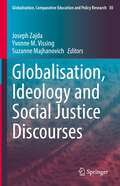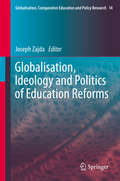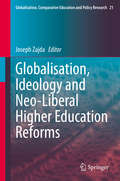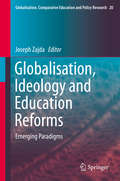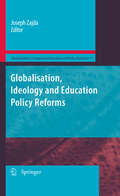- Table View
- List View
Globalization, Education and Social Justice
by Joseph ZajdaGlobalization, Education and Social Justice, which is the tenth volume in the 12-volume book series Globalisation, Comparative Education and Policy Research, presents up-to-date scholarly research on major discourses concerning global trends in education, social justice and policy research. It provides an easily accessible, practical yet scholarly source of information about the international concern in the field of social justice, globalisation, and policy research. Above all, the book offers the latest findings to the critical issues in education and social justice globally. It is a sourcebook of ideas for researchers, practitioners and policy makers in education, globalisation and social justice education reforms around the world. It offers a timely overview of current issues in social justice affecting education policy research in the global culture. It provides directions in education, and policy research, relevant to transformational educational reforms in the 21st century. The book critically examines the overall interplay between globalisation, education reforms, and social justice. It draws upon recent studies in the areas of globalisation, social justice education reforms and the role of the State. It explores conceptual frameworks and methodological approaches applicable in the research covering the State, globalisation, equity, education, and social justice. It demonstrates the neo-liberal ideological imperatives of education and policy reforms, and illustrates the way the relationship between the State and education policy affects current models and trends in education reforms for social justice and schooling globally. Various book chapters critique the dominant discourses and debates pertaining to the politics of social justice and education globally and the newly constructed and re-invented models of neo-liberal ideology in education and policy reforms. Using a number of diverse paradigms in comparative education research, ranging from critical theory to post-structuralist discourses, the authors, by focusing on globalisation, social justice and democracy, attempt to examine critically both the reasons and outcomes of education reforms and policy change for social justice. The volume offers a more informed critique on the Western-driven models of education reforms and implications for social justice. The book also draws upon recent studies in the areas of equity, cultural capital and dominant ideologies in education. The general intention is to make Globalization, Education and Social Justice available to a broad spectrum of users among policy-makers, academics, graduate students, education policy researchers, administrators, and practitioners in the education and related professions.
Globalization and Women in Academia: North/west-south/east (Sociocultural, Political, and Historical Studies in Education)
by Carmen LukeIn this cross-cultural exploration of the comparative experiences of Asian and Western women in higher education management, leading feminist theorist Carmen Luke constructs a provocative framework that situates her own standpoint and experiences alongside those of Asian women she studied over a three-year period. She conveys some of the complexity of global sweeps and trends in education and feminist discourse as they intersect with local cultural variations but also dovetail into patterns of regional similarities. Western feminist research has established that relatively few women hold senior positions in universities and colleges. Using the now common metaphor of the "glass ceiling," this research has developed a range of social, cultural, and institutional explanations for women's underrepresentation in academic life. International studies show that women in non-Western countries are also underrepresented in higher education. Yet do Western explanations and strategies for change hold for academic women working in non-Western universities? The very diversity among women's experiences calls into question many of the analytic tools, terms, claims, and solutions formulated by Western feminism. This is the first study to show how cultural differences figure into the institutional dynamics of "glass ceilings." It raises important theoretical and practical, strategic, and tactical questions about issues of cultural difference and institutional power.
Globalization and Transnational Academic Mobility
by Qiongqiong ChenThis book examines the way Chinese academics returning from the US re-establish their academic identities and professional practices at China's research universities in the context of higher education internationalization in China. It goes beyond economic accounts of academic mobility based on the notions of brain drain, brain gain, and brain circulation. Instead, it uses a cultural approach to explore the everyday experiences of the returning scholars concerning the issues of their sense of identity, as well as their ways of connecting and bringing about changes in their work communities. It will appeal anyone interested in 1) globalization and academic mobility; 2) China's talent policies and strategies; and 3) the internationalization of Chinese universities.
Globalization and the Singapore Curriculum
by Zongyi Deng S Gopinathan Christine Kim-Eng LeeThis volume provides a multi-faceted and critical analysis of the Singapore curriculum in relation to globalization. First, it details reform initiatives established by the Singapore government to meet the challenges posed by globalization. Next, Globalization and the Singapore Curriculum presents how these reforms have been translated into programs, school subjects and operational frameworks and then examines, in turn, how well these have been implemented in schools and classrooms across the country. Through this examination, the book reveals how the initiatives, together with their curricular translation and classroom enactment, reflect on the one hand global features and tendencies and, on the other, distinct national traditions, concerns and practices. It brings to light a set of issues, problems and challenges that not only concern policymakers, educators and reformers in Singapore but also those in other countries as well. Written by curriculum scholars, policy analysts, researchers and teacher educators, Globalization and the Singapore Curriculum offers an up-to-date reference for postgraduate students, scholars and researchers in the areas of curriculum and instruction, comparative education, educational sociology, educational policy and leadership in Singapore, the Asia Pacific region and beyond. It also offers a vital contribution to the story of modern education around the globe: providing international students, scholars and researchers valuable insights into curriculum and curriculum reform for the 21st century.
Globalization and the Rise of Mass Education (Palgrave Studies in Economic History)
by David Mitch Gabriele CappelliThis edited collection explores the historical determinants of the rise of mass schooling and human capital accumulation based on a global, long-run perspective, focusing on a variety of countries in Europe, the Middle East, Asia, Africa and the Americas. The authors analyze the increasing importance attached to globalization as a factor in how social, institutional and economic change shapes national and regional educational trends. Although recent research in economic history has increasingly devoted more attention to global forces in shaping the institutions and fortunes of different world regions, the link and contrast between national education policies and the forces of globalization remains largely under-researched within the field. The globalization of the world economy, starting in the nineteenth century, brought about important changes that affected school policy itself, as well as the process of long-term human capital accumulation. Large migrations prompted brain drain and gain across countries, alongside rapid transformations in the sectoral composition of the economy and demand for skills. Ideas on education and schooling circulated more easily, bringing about relevant changes in public policy, while the changing political voice of winners and losers from globalization determined the path followed by public choice. Similarly, religion and the spread of missions came to play a crucial role for the rise of schooling globally.
Globalization and Japanese Exceptionalism in Education: Insiders' Views into a Changing System (Routledge Research in International and Comparative Education)
by Ryoko TsuneyoshiGlobalization is the most common overriding characteristic of our time, with societies all over the world struggling to change their educational systems to meet what are perceived to be the needs of globalization. This book provides an insider's account of how the Japanese educational system is trying to meet that challenge while placing the developments in a larger international context. Distinguishing itself from other books in the same genre, this volume (1) brings in the diversity of insiders‘ reactions concerning globalization reform in education, while placing such actions in the larger international context, and (2) covers a wide span of education (elementary to higher education) and shows how the globalization reforms as a whole are affecting Japanese education. With a focus on insiders’ accounts, this book brings in information that is little known outside of Japan. It also links globalization processes in Japanese society, school education and higher education, accounting for similarities and differences across educational levels, providing insight into the multifaceted processes affecting the Japanese education system. Chapters include: From High School Abroad to College in Japan: The Difficulties of the Japanese Returnee Experience The University of Tokyo PEAK Program: Venues into the Challenges Faced by Japanese Universities Why Does Cultural Diversity Matter? Korean Higher Education in Comparative Perspective
Globalization and Human Rights
by Jesús Ballesteros Encarnación Fernández Ruiz-Gálvez Pedro TalaveraGlobalisation turns out to be untenable because it does not guarantee minimum social equity, peace and respect for the environment, and therefore does not guarantee the effective accomplishment of human rights. This book analyzes this issue and raises proposals for a new perspective. The first part describes the soft threats to human rights, derived from the devaluation of the politics and the productive economy with regard to the finance. It entails the concealment of the reality in the shape of exploitation as the tax havens and in the shape of marginalization of the persons with different abilities. The second part include a study of hard threats to human rights and examines two cases of failed states: Afghanistan and Somalia, in which the violence has supplanted the politics and the economy. In view of these situations it is necessary to rethink the force of classic ius gentium and the humanitarian right. The third part presents the European Union as a legal and political space in which conditions of a worthy life are better defended by means of the Primacy of Practical Reason and Social State of Law, and by the requirement of peace as the main rule of international relations.
Globalization and English Education in Taiwan: Curriculum, Perceptions, and Pedagogies (Routledge Research in Language Education)
by I-Chung KeKe’s book examines and reflects on English education in Taiwan from a global English perspective, starting with a discussion on globalization and global Englishes. English education in Taiwan has gone through various major transformations since the intensification of globalization after the 1990s. On one hand, children start to learn English ever earlier while on the other hand, the curriculum and materials in the vocational schools and at the tertiary level become diversified to meet various specific needs of English use. Internationalization of education has brought increasing numbers of international students, and the roles of English in Taiwan are changing constantly with the dynamic environment, from a foreign language to a lingua franca, medium of instruction, and an international language. In his book, the author documents the historical development of education and the roles of English in Taiwan before reviewing curriculum reforms and changes in the past half century. He then presents teachers' and students’ perceptions on global Englishes. He proposes global Englishes pedagogies and his views on what changes can be made to textbooks, learning materials, entrance exams, translation, and the linguistic environment. Practical suggestions to English education in Taiwan in the globalizing context serve as tentative conclusion for the book. Offering insights into English education and its relationship with globalization, Ke’s book will be useful to researchers and students in the fields of global Englishes and English education as well as offering practical pedagogical suggestions for English educators around the world.
Globalization and Educational Rights: An Intercivilizational Analysis (Sociocultural, Political, and Historical Studies in Education)
by Joel SpringThis is the first book to explore the meaning of equality and freedom of education in a global context and their relationship to the universal right to education. It also proposes evaluating school systems according to their achievement of equality and freedom. Education in the 21st century is widely viewed as a necessary condition for the promotion of human welfare, and thus identified as a basic human right. Educational rights are included in many national constitutions written since the global spread of human rights ideas after World War II. But as a global idea, the meaning of educational rights varies between civilizations. In this book, which builds on the concept of the universal right to education set forth in Spring's The Universal Right to Education: Justification, Definition, and Guidelines, his intercivilizational analysis of educational rights focuses on four of the world's major civilizations: Confucian, Islamic, Western, and Hindu. Spring begins by considering educational rights as part of the global flow of ideas and the global culture of schooling. He also considers the tension this generates within different civilizational traditions. Next, he proceeds to: *examine the meaning of educational rights in the Confucian tradition, in the recent history of China, and in the Chinese Constitution; *look at educational rights in the context of Islamic civilization and as presented in the constitutions of Islamic countries, including an analysis of the sharp contrast between the religious orientation of Islamic educational rights and those of China and the West; *explore the problems created by the Western natural rights tradition and the eventual acceptance of educational rights as represented in European constitutions, with a focus on the development and prominence given in the West to the relationship between schooling and equality of opportunity; and, *investigate the effect of global culture on India and the blend of Western and Hindu ideas in the Indian constitution, highlighting the obstacles to fulfillment of educational rights created by centuries of discrimination against women and lower castes. In his conclusion, Spring presents an educational rights statement based on his intercivilizational analysis and his examination of national constitutions. This statement is intended to serve as a model for the inclusion of educational rights in national constitutions.
Globalization and Education: Critical Perspectives (Social Theory, Education And Cultural Change Ser.)
by Carlos Alberto Torres Nicholas C. BurbulesFirst Published in 2000. Routledge is an imprint of Taylor & Francis, an informa company.
The Globalization and Corporatization of Education: Limits and Liminality of the Market Mantra
by Denise Blum and Char UllmanThe forces associated with globalization, whether economic or social, have conditioned the ways educators operate, and have profoundly altered people‘s experiences of both formal and informal education. Globalization, as a multidimensional, multilevel process, is unequivocally, but not exclusively, based on the economics of neoliberalism. This book chronicles new sites of tension in education that are a result of an ever-globalizing economy and its accompanying neoliberal practices in the United States, Costa Rica, and the US territories in the Caribbean. The contributions are grouped into two areas: institutionalized schooling practices and non-formal educational practices that focus on identities and language.Each chapter questions the neoliberal market mantra that education must be rebranded into a marketable product and consumed by individuals, making a complex and compelling ethnographic argument that the market mantra is bankrupt. The authors argue that globalization produces liminal subjects and leads to the destruction of social institutions like education that are essential to democratic governance. The aim of each article is to uniquely disentangle the dynamics of the process, so as to resolve the mystery of how globally inspired paradigms and policies mix with locally defined structures and cultures. In assessing globalization‘s relationship to educational change, we need to know how globalization and its ideological packaging affect schooling, from transnational paradigms, to national policies and to local practices.This book was originally published as a special issue of the International Journal of Qualitative Studies in Education.
Globalization and Change in Higher Education
by Beverly BarrettThis book sets out political economy explanations for higher education policy reform in Europe in the initial decades of the 21st century. With a sustained focus on the national level of policy implementation, institutional change is considered in relationship to broader trends in economic development and globalization. Since the concept of a "Europe of Knowledge" was presented by the European Commission in 1997, the pursuit of global competitiveness sets the context for the international initiative of the Bologna Process that has created the European Higher Education Area (EHEA). Growing from 29 to 48 participating countries, there are three core explanations for change in the policy process: globalization (economic), intergovernmentalism (political), and Europeanization (social). As part of multi-method research analysis, this book presents qualitative case studies on Portugal and Spain to consider points of comparison, including national governance history and modernization of higher education institutions. The structure of government in these countries affects the policy reforms. Ultimately, the Bologna Process serves as a model for integration of higher education reform in other world regions. This book is essential reading for students, researchers, and policy makers in the fields of education, economics, and public policy.
Globalization
by Marcelo Suarez-Orozco Desiree B. Qin-HilliardGlobalization defines our era. While it has created a great deal of debate in economic, policy, and grassroots circles, many aspects of the phenomenon remain virtual terra incognita. Education is at the heart of this continent of the unknown. This pathbreaking book examines how globalization and large-scale immigration are affecting children and youth, both in and out of schools. Taking into consideration broad historical, cultural, technological, and demographic changes, the contributors--all leading social scientists in their fields--suggest that these global transformations will require youth to develop new skills, sensibilities, and habits of mind that are far ahead of what most educational systems can now deliver. Drawing from comparative and interdisciplinary materials, the authors examine the complex psychological, sociocultural, and historical implications of globalization for children and youth growing up today. The book explores why new and broader global visions are needed to educate children and youth to be informed, engaged, and critical citizens in the new millennium. Published in association with the Ross Institute
Globalising Education: Trends and Applications (Routledge Studies In Distance Education)
by Robin MasonThis highly topical book charts how the tools of technology are altering the ways in which education is being delivered and received. It looks at the huge impact of the World Wide Web on current educational practice and what this means for the students and teachers involved. It also covers the other new technologies that support the delivery of what is now truly global education.Divided into three clear sections, Globalising Education adopts a systematic and thoroughly researched approach to this exciting topic. The three sections examine:* how global education is actually delivered in practice* case studies which investigate current developments and applications in the USA, Europe, the UK and Australia* conclusions drawn from the general issues covered, as well as an overview of what is happening now and what we might expect to happen in the future.This book looks at current developments in detail. It is essential reading for all those involved in education - whether as a teacher, student or interested onlooker.
Globalisation, Values Education and Teaching Democracy (Globalisation, Comparative Education and Policy Research #35)
by Joseph Zajda Pamela Hallam John WhitehouseThis book critiques dominant discourses and debates pertaining to values education, cultural identity and teaching democracy, set against the backdrop of growing social stratification and unequal access to quality education. It addresses discourses concerning globalisation, ideologies and the state, as well as approaches to values education and teaching democracy in schools. The book explores the ambivalent and problematic connections between the state, globalisation, values education and teaching democracy. It also explores conceptual frameworks and methodological approaches applicable to research on values education, multiculturalism and identity politics. Drawing on diverse paradigms, ranging from critical theory to globalisation, and by focusing on globalisation, ideology and values education, the book critically examines research dealing with cultural diversity and its impact of identity politics. Given the need for a multiple perspective approach, the authors have diverse backgrounds and hail from different countries and regions, offer a wealth of insights, contributing to a more holistic understanding of the nexus between values education, multiculturalism and national identity. With contributions from key scholars worldwide, the book should be required reading for a broad spectrum of users, including policy-makers, academics, graduate students, education policy researchers, administrators and practitioners.
Globalisation, Policy and Comparative Research
by Joseph Zajda Val RustThis book critically examines the overall interplay between comparative education discourses, globalisation, and education. It draws upon recent studies in relevant areas and explores conceptual frameworks and methodological approaches. It demonstrates the neo-liberal ideological imperatives of education and policy reforms, and illustrates the way the relationship between the State and education policy affects current models and trends in education reforms and schooling globally. Various chapters critique the dominant debates and the newly constructed and re-invented models of neo-liberal ideology in education. Using a number of diverse paradigms in comparative education research, ranging from critical theory to globalisation, the authors, by focusing on globalisation, ideology and democracy, examine both the reasons and outcomes of education reforms, policy change and transformation and provide a more informed critique on the Western-driven models of accountability, quality and school effectiveness.
Globalisation & Pedagogy: Space, Place and Identity
by Richard Edwards Robin UsherWith different pedagogic practices come different ways of examining them and fresh understandings of their implications and assumptions. It is the examination of these changes and developments that is the subject of this book. The authors examine a number of questions posed by the rapid march of globalisation, incuding: What is the role of the teacher, and how do we teach in the context of globalisation? What curriculum is appropriate when people and ideas become more mobile? How do the technologies of the internet and mobile phone impact upon what is learnt and by whom? The second edition of this important book has been fully updated and extended to take account of developments in technology, pedagogy and practice, in particular the growth of distance and e-learning.
The Globalisation of Intercultural Education
by Panayiotis Angelides Christina HajisoteriouThis book examines the intersection of globalisation and intercultural education by focusing on the trajectory of education policy: from development to adoption and implementation. The centrality of the nation-state has been constrained by a wide range of new socio-cultural, political and economic phenomena over the past decade such as globalisation, Europeanisation, modernisation, and global recession. The main implications of these developments have only just begun to unfold, and continue to be debated by policy-makers, academics, and educators. However, it is widely accepted that global socio-political and economic developments have allowed supranational institutions, functioning across nation states rather than within them, to perform many state functions with regards to education policy development and implementation. Yet, much remains unknown (and under-researched) about the impact of these still-nascent developments on the trajectory of intercultural education. This book sets out to fill in this gap by examining the intersection of globalisation and intercultural education through macro-micro integration. After all, for modern societies to establish social cohesion, education research should examine issues of citizenship, democracy, and intercultural education under the lens of globalisation.
The Globalisation of Higher Education: Developing Internationalised Education Research and Practice
by Timothy Hall Tonia Gray Greg Downey Michael SinghThis book argues that the neoliberal globalisation of higher education faces a need for recalibration. In light of increased concerns from universities in cultivating globalisation, this volume brings together a multi-ethnic and multilingual team of researchers who argue that the continued development of internationalized education now requires new research and practices. As university leaders seek to build the best programs to help students to go abroad, they can face a number of challenges – risk management, negotiating with diverse partners, designing rich experience-based learning and the hopes, fears and limitations of the students themselves. Consequently, the authors argue that changes are particularly important given the current US-centric and UK-centric structural readjustments to globalization policies across all fields of higher education and knowledge production. This multi-perspectival edited collection will appeal to students and scholars of global education, globalization and international education.
Globalisation, Nation-Building and History Education (Globalisation, Comparative Education and Policy Research #40)
by Joseph Zajda John WhitehouseThis book uses historiography and discourse analysis to provide a new insight into understanding the nexus between ideologies, the state, and nation-building—as depicted in history school textbooks. It focuses on the interpretation of social and political change, significant events, and examining possible new biases and omissions in school textbooks. The ‘Europeanization’ of history textbooks in the EU is an example of western-dominated Grand Narrative of pluralist democracy, multiculturalism, and human rights, according to the canon of a particularly European dimension. Various public debates in the USA, China, the Russian Federation (RF), Japan, and elsewhere, dealing with understandings of a nation-building, national identity, and history education point out to parallels between the political significance of school history and the history education debates globally.The book demonstrates that the issue of national identity and balanced representations of the past continue to dominate the debate surrounding the goals, dominant ideologies and content of history textbooks, and historical narratives. It concludes that competing discourses and ideologies will continue to define and shape the nature and significance of historical knowledge, ideologies and the direction of values education in history textbooks. This book provides an easily accessible, practical, yet scholarly insights into local and global trends in the field of history education, and should be required reading for a broad spectrum of users, including policy-makers, academics, graduate students, education policy researchers, administrators, and practitioners.
Globalisation, Ideology and Social Justice Discourses (Globalisation, Comparative Education and Policy Research #30)
by Joseph Zajda Yvonne M. Vissing Suzanne MajhanovichThis book examines dominant discourses in social justice education globally. It presents cutting-edge research on the major global trends in education, social justice and policy research. Using diverse paradigms, ranging from critical theory to discourse analysis, the book examines major social justice and equity education reforms and policy issues in a global culture, with a focus on the ambivalent and problematic relationship between social justice education discourses, ideology and the state. The book discusses democracy, ideology and social justice, which are among the most critical and significant factors defining and contextualising the processes surrounding social justice education reforms globally. It critiques current social justice education practices and policy reforms, illustrating the shifts in the relationship between the state, ideology, and social justice education policy.Written by authors from diverse backgrounds and regions, this book examines current developments in research concerning social justice education. It enables readers to gain a more holistic understanding of the nexus between social justice education, and dominant ideologies, both locally and globally. It also provides an easily accessible, practical, yet scholarly insights into local and global trends in the field of social justice education. Discourses of Globalization, Ideology and Social Justice, with contributions from key scholars worldwide, should be required reading for a broad spectrum of users, including policy-makers, academics, graduate students, education policy researchers, administrators, and practitioners.
Globalisation, Ideology and Politics of Education Reforms
by Joseph ZajdaThis 14th volume in the 24-volume book series sets out to explore the interrelationship between ideology, the state, and education reforms, placing it in a global context. It examines some of the major education reforms and policy issues in a global culture, particularly in the light of recent shifts in accountability, quality and standards-driven education, and policy research. By doing so, it provides a comprehensive picture of the intersecting and diverse discourses of globalisation and policy-driven reforms in education. The book draws upon recent studies in the areas of globalisation, equality, and the role of the state. It explores conceptual frameworks and methodological approaches applicable in the research covering the state, globalisation, and education reforms. It critiques the neo-liberal ideological imperatives of current education and policy reforms, and illustrates the way that shifts in the relationship between the state and education policy affect current trends in education reforms and schooling globally. Individual chapters critically assess the dominant discourses and debates on education and policy reforms. Using diverse comparative education paradigms from critical theory to historical-comparative research, the chapters focus on globalisation, ideology and democracy and examine both the reasons and outcomes of education reforms and policy change. They provide an informed critique of models of accountability, quality and standards-driven education reforms that are informed by Western dominant ideologies and social values. The book also draws upon recent studies in the areas of equity, cultural capital and dominant ideologies in education.
Globalisation, Ideology and Neo-Liberal Higher Education Reforms (Globalisation, Comparative Education and Policy Research #21)
by Joseph ZajdaThis book sets out to examine the neo-liberal dimensions of globalisation and market-driven economic imperatives that have impacted higher education reforms. It critiques the notions of accountability, efficiency, academic capitalism, quality of education, and the market-oriented and entrepreneurial university model, based on a neo-liberal ideology. The expansion of economic rationality into the educational sector is one the most ubiquitous dimensions of neo-liberalism and one of its most powerful ideological tools, resulting in the commodification, commercialization, and marketization of education and knowledge. The book critiques structural changes in education and the impact of neo-liberalism and globalisation on educational systems around the world. With this as its overall focus, the respective chapters present hand-picked scholarly research on major discourses in the field of global neo-liberal education reforms. The book draws upon recent studies in the areas of globalisation, neo-liberal education reforms, and the role of the state. It critically assesses the neo-liberal ideological imperatives of current education and policy reforms and illustrates how these shifts in the relationship between the state and education policy are shaping current trends in education policy reform outcomes. Taken together, the chapters offer a timely analysis of current issues affecting neo-liberal education policy research, and outline future directions that education and policy reforms could take.
Globalisation, Ideology and Education Reforms: Emerging Paradigms (Globalisation, Comparative Education and Policy Research #20)
by Joseph ZajdaThis book analyses the nexus between ideology, the state, and education reforms worldwide. The research evinces the neo-liberal ideological imperatives of current education and policy reforms and illustrates the way these shifts in the relationship between the state and education policy are affecting current trends in education reforms and schooling around the globe. With this as its focus, the chapters represent hand-picked scholarly research on major discourses in the field of global education reforms. Offering a compendium of the very latest thought on the subject, this book is, like the others in the series, a state-of-the-art sourcebook for researchers, practitioners and policymakers alike. Not only do the chapters offer a timely analysis of current issues shaping education policy research; the work also contains ideas about future directions that education and policy reforms could take. By doing so, it provides a comprehensive view of the diverse and intersecting discourses on globalisation and policy-driven reforms in education.The book draws on recent studies in the areas of globalisation, education reforms, and the role of the state. Respective chapters critically assess the dominant discourses and debates on education and policy reforms. Using diverse comparative education paradigms, ranging from critical theory to historical-comparative research, they focus on globalisation, ideology and democracy, and examine both the reasons for and outcomes of education reforms and policy change.
Globalisation, Ideology and Education Policy Reforms
by Joseph ZajdaThe eleventh in the 12-volume book series Globalisation, Comparative Education and Policy Research, this work sets out to explore the interrelationship between ideology and education reforms, setting it in a global context. With this as its focus, the chapters represent hand-picked scholarly research on major discourses in the field of comparative education. A compendium of the very latest thinking on the subject, this volume is, like the others in the series, a state-of-the-art sourcebook for researchers, practitioners and policymakers alike. Not only do the chapters offer a timely overview of current issues affecting comparative education and education policy research in what is now a global educational culture, but the work also contains ideas about future directions that policy reforms could take. The book draws upon recent studies in the areas of globalisation, equity, and the role of the State. It explores conceptual frameworks and methodological approaches applicable in the research covering the State, globalisation, and education reforms. The research evinces the neo-liberal ideological imperatives of current education and policy reforms, and illustrates the way that shifts in the relationship between the State and education policy affect current trends in education reforms and schooling globally. Individual chapters critically assess the dominant discourses and debates on comparative education research in education and policy reforms. Using diverse comparative education paradigms from critical theory to globalisation, the authors focus on globalisation, ideology and democracy and examine both the reasons and outcomes of education reforms, policy change and transformation. They provide a more informed critique of models of accountability, quality and school effectiveness that are informed by Western social values. The book also draws upon recent studies in the areas of equity, cultural capital and dominant ideologies in education.
